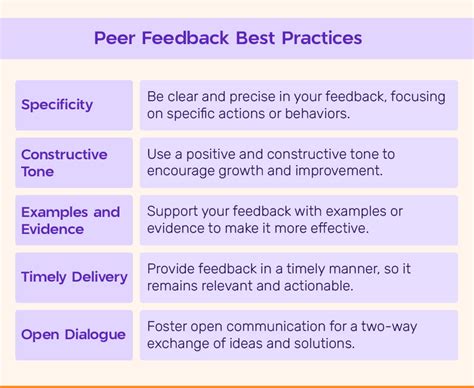How to Use Peer Feedback to Improve Your Learning

Peer feedback is one of the most valuable tools for personal and academic growth. It offers a fresh perspective on your work, highlights areas you might overlook, and encourages critical thinking. Whether you're a student, professional, or lifelong learner, integrating peer feedback into your learning process can help you identify strengths and areas for improvement. Here’s how to use peer feedback effectively to boost your learning journey.
Be Open to Constructive Criticism
One of the key elements in benefiting from peer feedback is the ability to accept and embrace constructive criticism. Feedback is not about being judged; it's about gaining insights that will help you improve. It can be uncomfortable at first, especially when the feedback points out flaws or weaknesses. However, a positive mindset is crucial. Instead of focusing on the criticism itself, focus on the opportunity for growth it presents.
Tip: Approach feedback with curiosity, not defensiveness. Ask questions to understand the feedback better and get clarification if needed.
Solicit Specific Feedback
General feedback like "good job" or "this needs work" may not provide the detailed guidance you need to improve. When asking for peer feedback, be specific about the areas you want to focus on. For example, if you're writing an essay, you might ask your peer to focus on the clarity of your arguments, the structure of your essay, or the relevance of your sources.
Tip: Frame your feedback request around specific aspects of your work, such as:
- "Could you help me clarify this paragraph?"
- "Do my main points flow logically?"
- "Can you point out any areas where I might improve my argument?"
Take Action on Feedback
Receiving feedback is only part of the process. To really benefit from peer feedback, you need to take action on it. After reviewing the feedback, reflect on how you can incorporate the suggestions into your work. Prioritize the areas that are most critical to your improvement.
For instance, if a peer suggests that your writing lacks clear transitions between paragraphs, make an effort to improve this aspect in your next draft. If they note that you could deepen your analysis of a particular concept, take time to revisit your research and add more substance to your arguments.
Tip: Create an action plan based on feedback. Write down the key suggestions and set specific goals for how you will implement them in your work.
Give Thoughtful Feedback in Return
Peer feedback is a two-way street. Giving feedback not only helps others improve, but it also deepens your understanding of the material and strengthens your critical thinking skills. When providing feedback to your peers, focus on being constructive, specific, and respectful. Acknowledge the strengths in their work as well as areas for improvement, and offer actionable suggestions.
Tip: Follow the "sandwich" method for giving feedback:
- Start with positive comments ("I really liked your analysis of this concept.").
- Provide constructive criticism ("It might be clearer if you break this section into two parts.").
- End with a positive note or suggestion for future work ("Great job overall—just tweak these areas, and it will be even stronger!").
Use Peer Feedback to Gain Different Perspectives
One of the most valuable aspects of peer feedback is the diversity of perspectives it offers. Peers come from different backgrounds, experiences, and areas of expertise, which means they can spot things you might miss. Whether you're working on a group project, writing a paper, or preparing for a presentation, hearing different viewpoints can help you refine your ideas and see things from new angles.
Tip: When receiving peer feedback, consider how different perspectives might challenge your assumptions. Even if a suggestion doesn't immediately resonate, think about how it could expand your thinking.
Cultivate a Growth Mindset
The concept of a "growth mindset," coined by psychologist Carol Dweck, is essential when it comes to using peer feedback to improve your learning. A growth mindset is the belief that abilities and intelligence can be developed over time through effort, perseverance, and learning. When you embrace a growth mindset, you view feedback as a tool for growth rather than as a sign of failure.
Tip: Remind yourself that learning is a process. Mistakes and setbacks are opportunities to improve. With each piece of feedback, you are building the skills and knowledge that will contribute to your overall growth.
Engage in Ongoing Peer Collaboration
Feedback doesn’t have to be a one-time event. Engaging in ongoing collaboration with peers can foster continuous improvement. Instead of just seeking feedback at a single point in time, try to establish a process where you regularly exchange feedback with peers. For example, if you’re working on a long-term project or research paper, you can share drafts at various stages and use peer feedback to make incremental improvements.
Tip: Set up regular peer feedback sessions throughout the learning process, rather than just at the end of a project. This will give you the opportunity to refine your work as you go along.
Learn How to Self-Reflect
While peer feedback is invaluable, it’s also important to develop your ability to self-reflect. After receiving feedback from peers, take time to think critically about your work and how you can improve. Self-reflection helps you internalize the feedback and become more autonomous in your learning. As you practice this skill, you'll become better at spotting areas for improvement on your own, which will enhance your ability to learn independently.
Tip: After reviewing feedback, ask yourself questions like:
- "What did I learn from this feedback?"
- "How can I apply these suggestions to my future work?"
- "What can I do differently next time to avoid the same mistakes?"